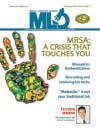Letters to the editor
Readers respond
Do techs want to eat their young?
What really bothers me is her attitude. This is
why I am now seeking employment outside of the medical field and am
willing to take a pay cut to do so. After working at two different
hospitals, I find myself in situations (on second and third shifts) that
I am working as hard as I can, sacrificing breaks, hurrying through
meals, to satisfy the workload and provide quality lab work to the
patients — all the while smiling and staying positive to make sure the
patient has a quality experience. I cannot maintain that kind of
workload and receive mostly negative feedback from the first-shift
supervisors — most of which comes across as pretty easily corrected
oversights. When I find an error, I fix it if I can and move on. There
is seldom time for lengthy review, and no desire to play “gotcha.”
I would love to find a lab where the techs that
have the experience want to share their knowledge with the
less-experienced people. Where lab techs show compassion and benefit of
the doubt before going for the jugular in an attack based on a
hard-nosed attitude on policy. While the people on first shift
demonstrate some patience, in my short experience, especially at one
hospital in particular, during my training I often heard the techs
openly voice their opinions about the hopelessly incompetent techs that
work second and third shifts, and one of those was the shift they were
training me for! I quickly found out that there are older techs on first
shift that like to eat their young and enjoy a good spirit-crushing
counseling session every so often. That is exactly how this person came
across in her letter to you through my eyes and my experience. Who can
learn from someone with that perspective? Who can learn when the teacher
automatically assumes you are incompetent and untrainable? How can you
maintain your morale when you “bust your butt” every night and get this
kind of attitude from your own department? I have certainly had enough.
I hear Boulevard Beer is hiring lab techs. Maybe they will hire me, and
I can talk them into bringing back the mouth pipette!
—Karen Ann Abrams,
MT(ASCP)
LaMonte, MO
Echoes of a profession in crisis
On Feb. 25, the heroic Capt. Chelsey “Sully”
Sullenberger, the pilot who successfully landed in the Hudson River, spoke
before Congress expressing the concerns facing professional airline pilots
in a post-September 11th world. As I listened to him speak of the difficulty
the industry was having recruiting highly trained and qualified pilots into
the field due to pay and benefit issues and the focus on the “bottom line”
by airline companies in general, I could not help but parallel his words to
the medical laboratory profession.
Both professions require individuals to use their
skills and training on a daily basis to make decisions that significantly
affect human lives. The ability to recognize an abnormal result, to
investigate the cause, determine the validity, and take the necessary action
may be the difference between life and death.
Inexperienced or poorly trained staff does not have
the same ability to recognize that unusual organism or suspicious
sensitivity pattern that would cause them to investigate further. An
inexperienced pilot may not have been able to land that plane safely in the
Hudson River, saving the lives of all on board.
The economic future of this country is uncertain, and
we must all make fiscally responsible decisions in our personal and
professional lives. The most important factor to remember when making such
decisions is that more than just the “bottom line” is at stake. As my father
always said, “You get what you pay for.”
—Darlene Hardin,
MT(ASCP) SM
Microbiology-Anatomic Pathology Manager
Cape Fear Valley Health System
Fayetteville, NC
Editor's note: We thank Karen Ann
Abrams and Darlene Hardin for their thought-provoking letters about the
“state of the medical laboratory.”
Confused in Iowa
I was recently reading the February 2009, Vol. 41, No
2 issue of MLO. On the cover was a heading, “Recruiting and retaining
lab techs.” I found no such article in the magazine. I read the article “The
staffing agency 'scoop' on how to find employment” and the insert on
“writing a recommendation.” These articles seem to be for employees and less
for employers. Did I miss something? Thanks,
—Toby R. Steckler, MLT,
BSMT(ASCP)Technical Supervisor, Laboratory
Audubon County Memorial Hospital
Audubon, IA
Editor's note: There was a “short circuit” between the
cover and the articles, both of which dealt with “being recruited”
either as an MLT or MT to find a job or as a person who could give a
recommendation to an MLT or MT. We apologize for the confusion.


